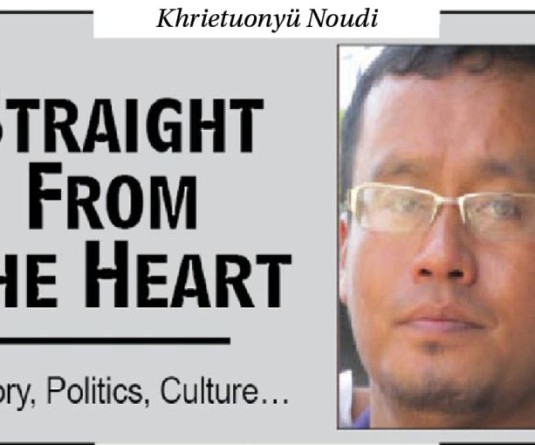
Grace Mossang
Education Secretary, Wesean Naga Students Union
I write this with a heart heavy with sorrow, anger, and an unyielding sense of pride in who we are. I write for my people, the Nagas of Arunachal Pradesh, who have been forgotten not just by the state we live in, but by the land we call our mother and the brothers and sisters who share our blood.
The hills of Tirap, Changlang, and Longding (TCL) are my home. They are not just lands—they are alive with the memories of our ancestors, the songs they sang, the stories they passed down, and the prayers they whispered into the wind. Yet, today, those hills feel suffocated. Our rivers, once so free, now flow burdened by the tears of exploitation. Our forests, the guardians of our traditions, are being stripped bare by the greed of outsiders. And we, the Nagas of Arunachal, stand forgotten, fighting a battle not just for our survival but for our identity.
In the TCL districts, the weight of neglect is everywhere. Over 30% of our people live in poverty, many surviving on less than ₹40 a day. Our literacy rates are shockingly low, and our schools are crumbling. How can we dream of a future when even our present has been stolen from us? The Arunachal government, backed by the central government, has done little but exploit our region. The oil fields of Kharsang and Jairampur churn out wealth, yet our villages remain dark. The coal mines of Changlang produce millions, yet our children go hungry. We live in a land of riches, yet we are left with nothing.
But the greatest theft is not of our resources—it is of our identity. Recently, there have been attempts to strip us of our Naga heritage, to erase us from the narrative of who we are. Maps are redrawn, identities rewritten, and our voices silenced. They call it "administrative adjustments," but we see it for what it is: an assault on our existence.
And where is the state government in all this? Where are the leaders who are supposed to represent us? Many of them are from the Tani tribes, who dominate Arunachal's political landscape. They look down on us, treat us as lesser, and dismiss our demands. Just recently, many Tanis even tried stripping us Nagas, from our “ST” Status, alongside trying for decades to remove the Naga heritage from us. Stating this however, I do not hate the Tanis—I cannot. They, too, are victims of the same system. But it pains me to see how brainwashed they have become, how they have allowed themselves to be used as tools by the government in New Delhi.
The central government has long had a strategy for the Northeast: divide and rule. They pit tribe against tribe, brother against brother, and then step back, letting us destroy each other while they take what they want. They did this to Manipur and are now doing it to us. The Rashtriya Swayamsevak Sangh (RSS) has been systematically eroding our cultures, imposing their own beliefs and practices. In many parts of TCL, sacred Naga sites have been desecrated, replaced with shivlings and temples- that spawned from nowhere. They call it "integration," but it feels like erasure.
Yet, the Tanis do not see it. They have lost so much of their own culture to Hindi dominance that they now act as if their mission is to see us lose ours too. They mock our traditions, dismiss our demands, and treat us as threats. But we are not their enemies. In fact, we should be allies, standing together against the forces that seek to destroy us both.
And where are our brothers and sisters in Nagaland? When Mizoram saw the suffering of the Kuki people, they rose as one. Their leaders, their civil society, their churches—all stood in solidarity. But Nagaland remains silent. Are we not Nagas too? Do we not share the same blood, the same heritage, the same dreams? Why does the land of Nagaland, which we hold so dear, not hold us in return?
I have asked myself this question countless times: When will Nagaland remember us? When will they see us as their own? The silence from Kohima is deafening. Their leaders, their activists, their churches—they all remain indifferent to our plight. It is as if we do not exist. But we do. We are Nagas. Our ancestors walked the same paths, spoke the same prayers, and dreamed the same dreams. Do not let geography divide us.
We have been demanding an autonomous council for years. We have even asked to join Nagaland. But our cries are met with resistance from the Arunachal government, who fears losing control, and indifference from Nagaland, who seems unwilling to welcome us. How long must we fight this battle alone?
Every day, I wake up with a heavy heart but a burning resolve. I look at my people, struggling yet resilient, and I feel a deep pride in who we are. We are the Nagas of Arunachal Pradesh. We are the keepers of an ancient legacy, the guardians of traditions that have survived centuries of change. And we will not be erased.
To the government in Itanagar and New Delhi, I say this: You may try to silence us, to exploit us, to erase us, but you will not succeed. We are stronger than you think.
To the Nagas of Nagaland, I plead: Remember us. Stand with us. Do not let us fight this battle alone.
And to my fellow Nagas in TCL, I say this: Hold your heads high. Remember who you are. We come from a proud lineage, and no government, no corporation, no oppressor can take that away from us.
Our fight is not just for survival—it is for our identity, our heritage, our future. And we will not rest until we are seen, heard, and respected. For we are Nagas. And we will not be forgotten.




